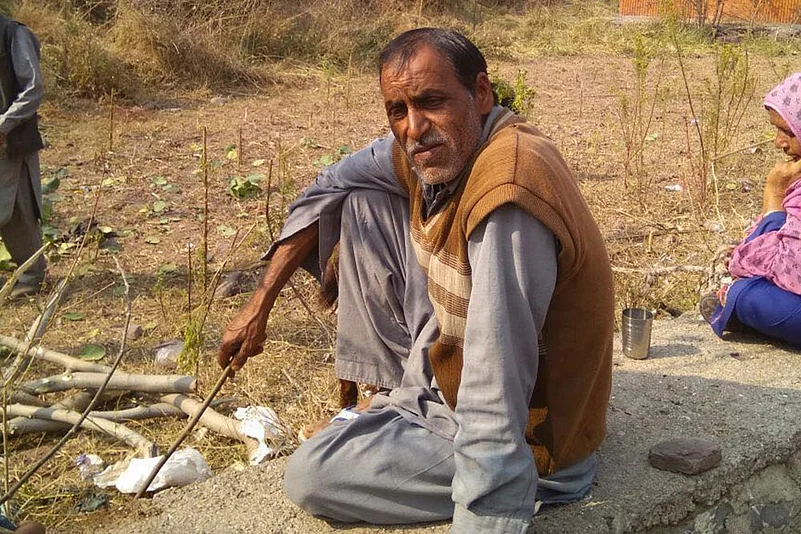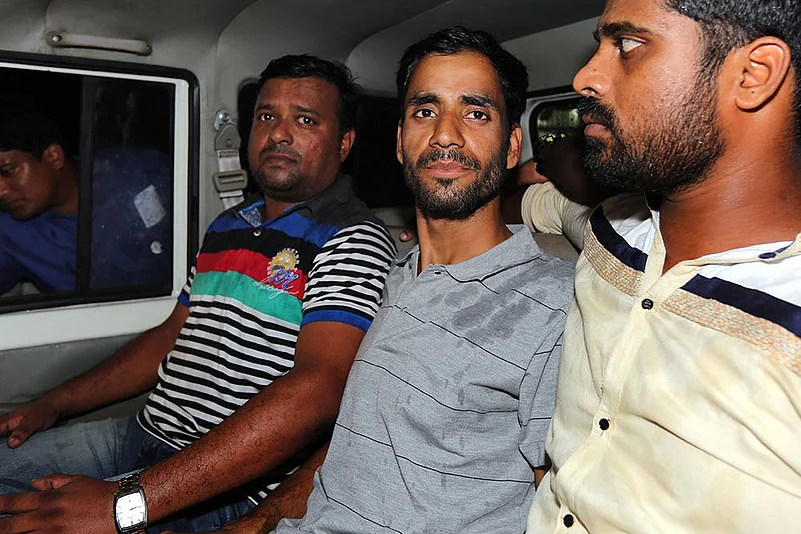None at Salamabad market believes that Sajjad Ahmad Mughal can commit a murder. It’s another matter the local youth has been re-arrested at Sonamarg hill-station, some 20 months after he jumped parole and went missing from a Maharashtra prison. At the start of this autumn, police succeeded in chasing the 25-year-old who was serving a life-term in the Nashik central jail for the murder of a female lawyer.
Sajjad was working as a watchman in an upscale Mumbai apartment five years ago when advocate Pallavi Purkayastha was found murdered in one of its flats. The victim’s body, found in her 16th-floor home on the morning of August 9, 2012, bore 16 stab wounds. Her throat was slit. The incident at the plush ‘Himalayan Heights’ in Wadala was reported to the city police after Pallavi’s fiancé Avik Sengupta ‘discovered’ her lying in a pool of blood.
The prosecution in the case had examined 40 witnesses, and the defence three. Among the suspects was Sajjad, who, the police said, used to ogle at the 25-year-old lawyer, the daughter of IAS officer Atanu Purkayastha. The Kashmiri youngster refuted all the allegations and his lawyer Wahab Khan even argued that the murderer was Avik, who had first met her at their law school. The sessions court eventually found Sajjad guilty. The judge, on feeling that the crime did not fall in the ‘rarest of the rare’ category, sentenced him to life imprisonment.
It was in July 2014, Sajjad was convicted of criminal trespass, molestation and murder of Pallavi, who was an advisor to filmmaker Farhan Akhtar’s firm Excel Entertainment. Sajjad was sent to Nashik central jail following the verdict by sessions judge Vrushali Joshi. One-and-a-half years later, he was released on parole. Jail authorities didn’t hand him over to anyone then in February 2016, and the youth didn’t return after his 30-day parole. At this, the Mumbai police started the chase.
Long thence, in the night of this October 10, they nabbed Sajjad from Kashmir. The Mumbai police located his position through the GPS and found him working as a labourer at Z-Morh tunnel, where construction is on to provide all-weather road connectivity to the tourist spot Sonamarg. The man was arrested in Gagenger, which falls in the rugged area that mostly remains closed during winters due to heavy snow. The work on of 6.5-km tunnel had begun in May 2015.
“The Mumbai Police have done a commendable job,” says Ganderbal senior superintendent of police Fayaz Ahmad Lone, posted on the eastern side of the Valley, around 100 km from Salamabad. “We did get information from the Mumbai police that Sajjad was hiding somewhere in Sonamarg area.” It is not easy to enter Salamabad in Uri sector on the Line of Control that marks the border with Pakistan. There are restrictions on the movement; gunfights between infiltrators and the army are regular.
The Mumbai police cops, dressed in civvies, succeeded in getting Sajjad to come out to meet them. It was only then the youngster realised he had been trapped. Sajjad was arrested and first taken to questioning at the Gund police station. “I found him very disturbed,” says Lone. After interrogation and verification, Sajjad was handed over to the Mumbai police. “He was working as a labourer at the site. He was brought there for work by his uncle, who was a contractor with the company.” Imtiyaz Hussain, Senior SSP of the sensitive Baramulla district under which Uri falls, says the Jammu and Kashmir police provided all help to its Mumbai counterpart in tracing Sajjad.
The whole region is a high-security zone. At the Army’s traffic control point (TCP) of the Uri town on the left bank of the Jhelum and 10 km from the LoC, it requires the police permission to enter Salamabad. That necessitates passes from the Uri police station, obtained after verifications of documents.
The local police say they had no information about Sajjad when he was released on parole from the Nashik jail—without any escort—to meet his ailing mother Haseeda Begam. “There has to be a proper takeover process when you let anyone on parole,” says a police officer at the Uri police station. “In Sajjad’s case, it was more than three months after his parole that we got information that he hasn’t returned. We called the Sajjad family several times and inquired about him. They didn’t reveal anything.”

Salamabad is known for its Trade Facilitation Centre the government constructed to host trucks from Pakistan-Occupied Kashmir that enter the state from Muzaffarabad. Everyone in Salamabad market, with around ten shops, knows about Sajjad—as a labourer who went to Mumbai for work and got arrested on charges of a lawyer’s murder. They believe he is innocent.
A shopkeeper points towards a road that leads uphill, where Sajad lives. That locality is dotted with two-storey houses, peopled by government employees working in the police, health and education departments. It’s a largely prosperous area, also owing to the cross-LoC trade and power companies that give jobs to locals in their projects.
Outside Sajjad’s house, a villager says the convict’s father, Abdul Aziz, is in the farm—and only he has pertinent information. In the nearby field, Aziz sits on a stone plinth, watching his neighbour cutting the branches of a fallen tree. He shows no interest in talking about his son. “All I know is that Sajjad has been arrested; he will not come back. For the past four years, we virtually die every day,” he says, desultorily. “My son did come here…once, for three days. He left, saying he will go to Mumbai. Since then Sajjad called us once or twice. When the (Mumbai) police came here, we gave them the number from which he was calling us.”
Aziz doesn’t remember the dates. “Well, when HCC (Hindustan Construction Company) started working on the Uri (hydroelectric) project, Sajjad was working there as a labourer. HCC completed its work probably in 2010, after which my son left for Jammu and then to Mumbai for work. We don’t have much money,” he reveals. “He was a good guy, hard-working. No bad habits.”
Everything was “fine”, to Aziz and his wife, till 2012. “Then we heard Sajjad has been arrested in a murder case. We were shocked,” he says, “Till his arrest, he used to call us regularly. Often, Sajjad talked to his mother.” Aziz went to Mumbai once to meet Sajjad in the jail. “I don’t know about the courts…or whether my son has got a fair trial. My son has had no police record.”
Aziz, tall and lanky, appears intrigued over why the police didn’t inform his family when they released Sajjad. “Even I had to spend two months in the police lock-up after his jumping the parole,” he adds. “I keep hearing this word ‘life sentence’. What does it mean? Won’t my son return?” Incidentally, the Maharashtra government has filed an appeal in the Mumbai High Court, seeking enhancement of the punishment to a death sentence.
The villagers at Salamabad assume that Sajjad has been falsely implicated. They echo what Aziz says about why, among all the accused, his son was sentenced: “Kashmiri tha, kya karta (It’s helpless for a Kashmiri).” According to the neighbours, it is “not difficult to catch anyone” in Kashmir. Chimes in Aziz: “Talk to Wahab (lawyer), he knows everything.”
From March 2016, it was clear that Sajjad hadn’t returned to the Nashik jail after his month-long parole. That set the alarm bells, and the start of a long chase for the Mumbai police. Last year, they couldn’t achieve much success as the Jammu and Kashmir Police was dealing with the prolonged protests in the Valley following the July 8 killing of militant Burhan Wani.
At the Uri town today, it’s business as usual for the army personnel at the TCP. They make a record of the entry of each vehicle, its number and those who have secured their permission from the police to visit Salamabad. After the procedures, the men hand over to the driver a chit, which he produces before the army at the next check-post. “Uri being a border area, we are prone to infiltration,” says a policeman, “That warrants such detailed security arrangement.” Only last year, on September 18, militants had attacked the army’s Brigade Headquarters here, leaving 19 soldiers dead and 18 wounded.
Back in Mumbai, Pallavi’s father had openly made clear his desperation over the court judgement. In a newspaper column later, Purkayastha wrote, “Exactly how many times must a victim be stabbed to merit extreme cruelty in your dictionary, Justice Joshi?” It’s more a statement than a question.
By Naseer Ganai in Uri


























